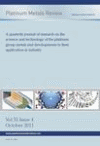Platinum Metals Review - Volume 55, Issue 1, 2011
Volume 55, Issue 1, 2011
-
-
Palladium-Based Alloy Membranes for Separation of High Purity Hydrogen from Hydrogen-Containing Gas Mixtures
More LessAuthors: By Gennady S. Burkhanov, Nelli B. Gorina, Natalia B. Kolchugina, Nataliya R. Roshan, Dmitry I. Slovetsky and Evgeny M. ChistovPalladium-based alloys with yttrium, copper, ruthenium or indium additions were investigated. Their specific hydrogen permeability, strength, linear thermal expansion in hydrogen and corrosion resistance in a number of gas media were determined. This allowed effective membrane elements to be developed using membranes made from these alloys, which are used for the separation of high purity hydrogen from hydrogen-containing gas mixtures. Membrane elements with 93.5 wt% palladium-6 wt% indium-0.5 wt% ruthenium alloy membranes were developed by the authors’ research group, and their technical characteristics are described.
-
-
-
CAFC9: 9th Congress on Catalysis Applied to Fine Chemicals
More LessAuthors: Reviewed by José M. Fraile and Clara I. Herrerías
-
-
-
The Role of Process Parameters in Platinum Casting
More LessAuthors: By Ulrich E. Klotz and Tiziana DragoPlatinum is a challenging material for casters because of its physical properties, which result in possible crucible and flask reactions during melting and casting, high shrinkage porosity and difficulties in filling of filigree items. This paper summarises the results of a collaborative research effort by several industrial partners and FEM on the influence of casting process parameters. Two common platinum jewellery alloys (platinum with 5 wt% cobalt and platinum with 5 wt% ruthenium) and four different investment materials were used for casting experiments with variation of atmosphere, casting and flask temperature, tree design and centrifugal machine parameters. Detailed sample investigation found shrinkage porosity and surface defects to be the main problems. Optimised process parameters for heavy and filigree items were identified. Future research on platinum casting should focus on casting simulation in order to reduce experimental effort and costs.
-
-
-
10th Scientific Bases for the Preparation of Heterogeneous Catalysts
More LessBy Reviewed by Jennifer Houghton
-
-
-
“Metathesis in Natural Product Synthesis”
More LessAuthors: Reviewed by Valerian Dragutan and Ileana Dragutan
-
-
-
Haren Gandhi 1941–2010: Contributions to the Development and Implementation of Catalytic Emissions Control Systems
More LessBy By Martyn V. TwiggThroughout his long and distinguished career with the Ford Motor Company Haren Gandhi was concerned with controlling tailpipe pollutants from cars, and through his work this article reviews the huge amount of progress made during his four-decade career. His early work with gasoline engines embraced all of the major developments ranging from the first platinum-based oxidation catalysts through nitrogen oxides (NOx) reduction using platinum-rhodium catalysts and the later introduction of palladium into three-way catalysts (TWCs) via ‘trimetal’, palladium-rhodium and palladium-only formulations. Gandhi’s other work included the interactions of poisons with catalysts as part of maintaining their in-use performance, the potential for using ruthenium in NOx control in gasoline TWCs and NOx adsorbing catalysts (NACs) for lean-burn engines, and the use of zeolite-based selective catalytic reduction (SCR) catalysts for effective diesel engine NOx control. Gandhi received many awards and honours in recognition of his technical achievements and a selection is mentioned here. Haren Gandhi is remembered with tremendous fondness and respect throughout the automotive industry concerned with exhaust gas emissions control and his technical contributions towards improving the quality of the air we breathe will continue to benefit us all.
-
Volumes & issues
-
Volume 58 (2014)
-
Volume 57 (2013)
-
Volume 56 (2012)
-
Volume 55 (2011)
-
Volume 54 (2010)
-
Volume 53 (2009)
-
Volume 52 (2008)
-
Volume 51 (2007)
-
Volume 50 (2006)
-
Volume 49 (2005)
-
Volume 48 (2004)
-
Volume 47 (2003)
-
Volume 46 (2002)
-
Volume 45 (2001)
-
Volume 44 (2000)
-
Volume 43 (1999)
-
Volume 42 (1998)
-
Volume 41 (1997)
-
Volume 40 (1996)
-
Volume 39 (1995)
-
Volume 38 (1994)
-
Volume 37 (1993)
-
Volume 36 (1992)
-
Volume 35 (1991)
-
Volume 34 (1990)
-
Volume 33 (1989)
-
Volume 32 (1988)
-
Volume 31 (1987)
-
Volume 30 (1986)
-
Volume 29 (1985)
-
Volume 28 (1984)
-
Volume 27 (1983)
-
Volume 26 (1982)
-
Volume 25 (1981)
-
Volume 24 (1980)
-
Volume 23 (1979)
-
Volume 22 (1978)
-
Volume 21 (1977)
-
Volume 20 (1976)
-
Volume 19 (1975)
-
Volume 18 (1974)
-
Volume 17 (1973)
-
Volume 16 (1972)
-
Volume 15 (1971)
-
Volume 14 (1970)
-
Volume 13 (1969)
-
Volume 12 (1968)
-
Volume 11 (1967)
-
Volume 10 (1966)
-
Volume 9 (1965)
-
Volume 8 (1964)
-
Volume 7 (1963)
-
Volume 6 (1962)
-
Volume 5 (1961)
-
Volume 4 (1960)
-
Volume 3 (1959)
-
Volume 2 (1958)
-
Volume 1 (1957)
Most Read This Month

Most Cited Most Cited RSS feed
-
-
Metal-Ligand Exchange Kinetics in Platinum and Ruthenium Complexes
By By Jan Reedijk
-
-
-
The Preparation of Palladium Nanoparticles
By By James Cookson
-
-
-
Diesel Engine Emissions and Their Control
By By Tim Johnson
-
-
-
Recycling the Platinum Group Metals: A European Perspective
By By Christian Hagelüken
-
-
-
A Healthy Future: Platinum in Medical Applications
Authors: By Alison Cowley and and Brian Woodward*
-
-
-
Palladium-Based Alloy Membranes for Separation of High Purity Hydrogen from Hydrogen-Containing Gas Mixtures
Authors: By Gennady S. Burkhanov, Nelli B. Gorina, Natalia B. Kolchugina, Nataliya R. Roshan, Dmitry I. Slovetsky and Evgeny M. Chistov
-
-
-
A Review of the Behaviour of Platinum Group Elements within Natural Magmatic Sulfide Ore Systems
Authors: By D. A. Holwell and I. McDonald
-
-
-
Platinum as a Reference Electrode in Electrochemical Measurements
Authors: By Kasem K. Kasem and Stephanie Jones
-
-
-
Carbon Nanotubes as Supports for Palladium and Bimetallic Catalysts for Use in Hydrogenation Reactions
Authors: R. S. Oosthuizen and V. O. Nyamori
-
- More Less

